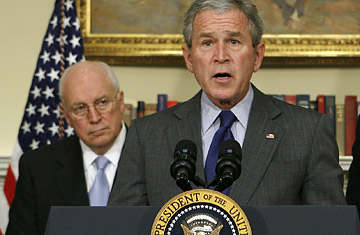
President George W. Bush makes a statemen with Vice President Dick Cheney on the economy in the Roosevelt Room at the White House in Washington January 18, 2008.
When histories of the Iraq war are written, scholars will want to know how the Bush Administration came to grips with one of the nation's costliest intelligence blunders: inflated estimates of Saddam Hussein's arsenal and his links to al-Qaeda. But they may have to reconstruct some pivotal moments without access to a key channel of official communication, e-mails flowing to and from the President's closest White House aides. According to one official analysis, there were 12 days without archived e-mail from the President's inner offices during a troubled period, December 2003 to February 2004, when it became clear that the central premise of the war — the presence of weapons of mass destruction (WMD) in Iraq — had collapsed.
Those dozen days are part of a large body of records that White House technical experts had reported missing last fall in a closed meeting with the staff of Rep. Henry Waxman's House Committee on Oversight and Government Reform. Last week Waxman revealed the extent of the archives allegedly missing from several executive offices: a total of 473 days from 2003 to 2005. One expert put together a chart that seemed to indicate substantial amounts of e-mail traffic had not been retained from White House computer servers. Waxman said he made the allegations public after a White House official insisted that "we have actually no reason to believe that any e-mails are missing."
But a non-profit watchdog group says that situation is even worse than Waxman had presented it. Anne Weismann, chief counsel of Citizens for Responsibility and Ethics in Washington (CREW) said the Democratic Congressman's analysis focuses only on days of no e-mail records, omitting weeks for which there was a significantly low volume of e-mail. An informant told her group that the White House typically logs as many as 100,000 e-mails a day but there were days when as few as five were archived. CREW has sued the White House over the missing e-mail.
The Presidential Records Act requires preservation of all White House documents and messages, including e-mail. Internal communications in this Administration will be scrutinized by Bush critics who believe that intelligence pointing to WMD possessed by Saddam was manipulated to justify the Iraq war.
This week, White House spokesman Scott Stanzel told TIME that e-mail retention or backup systems have operated continuously in the Bush years. He also questioned the earlier work of tech experts, saying their findings had not been verified in an ongoing examination. "It's our belief that all or substantially all e-mails should be available," Stanzel said.
The White House's chief information officer, Theresa Payton, said in a court filing last week that her office is trying to determine if there had been "anomalies" in archiving between 2003 and 2005. Whether or not there had been archiving gaps, she said, backup tapes "regularly" created for messages should contain "substantially all the e-mails sent or received" in the time period addressed by Waxman and CREW.
But an IT expert working for CREW, Chris Hertz, said that such tapes are useful for disaster recovery, not consistent e-mail retention. Backup systems take a snapshot of e-mails at a particular time and date, but don't record anything deleted between snapshots. Without a viable archival system, he said, there would be "gaping holes" in message retention. Spokesman Stanzel said the White House had phased in a sophisticated journaling system for its e-mails between 2002 and 2004, a time period in which an older Clinton-era system was partly in place.
Waxman began investigating e-mail practices last year after the White House acknowledged the disappearance of messages, sent on Republican Party accounts, discussing the firing of U.S. attorneys. In a letter sent late last week to presidential counsel Fred Fielding, Waxman said briefers had presented a chart showing no archived e-mails for long stretches at the White House offices of environmental quality, economic advisers, budget and trade. Potentially more troubling from a historian's point of view are the 16 days of e-mails that were reported missing from the office of Dick Cheney, widely regarded as the most influential vice president in U.S. history, and the 12 days missing from the White House Office (WHO). Although Bush himself does not send or receive e-mail, the WHO orbit includes his chief of staff and political advisers, who would have participated in a reevaluation of intelligence on Iraq.
The missing archives for WHO fall between December 17, 2003 and February 8, 2004, an apparently tense period for Bush in which everyone from his secretary of state to CIA chief publicly backed off earlier intelligence estimates of al-Qaeda's influence and the presence of weapons of mass destruction in Iraq. The Administration withdrew its special weapons search team from Iraq after months of futility. And bowing to political pressure, the President created a bipartisan panel to investigate the failures of U.S. spy agencies.
It is therefore a period of intense interest to those studying the war. Waxman, who has scheduled a Feb. 15 hearing into the issue, says: "Without complete records, the real record of the Bush White House may never be revealed. As history has shown, the records from previous Presidents such as Kennedy, Johnson, and Nixon deeply affected our understanding of actions those Administration took. The American people deserve to know the same for the Bush Administration."
